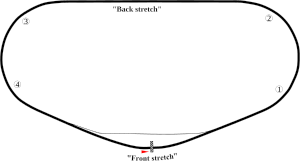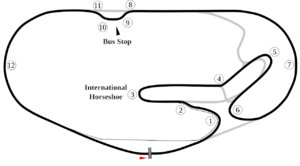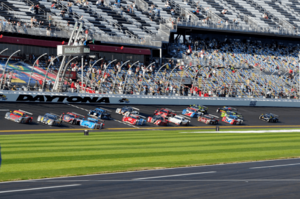Daytona International Speedway facts for kids

|
|
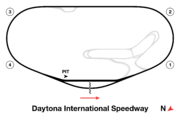 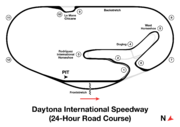 |
|
| Location | 1801 West International Speedway Blvd, Daytona Beach, Florida 32114 |
|---|---|
| Time zone | UTC−5 (UTC−4 DST) |
| Coordinates | 29°11′8″N 81°4′10″W / 29.18556°N 81.06944°W |
| Capacity | 101,500–167,785 (w/ infield, depending on configuration) 123,500 (grandstand capacity) |
| Owner | NASCAR (2019–present) International Speedway Corporation (1959–2019) |
| Operator | NASCAR (1959–present) |
| Broke ground | November 25, 1957 |
| Opened | February 22, 1959 |
| Construction cost | US$3 million |
| Architect | Charles Moneypenny William France, Sr. |
| Major events | Current:
Former:
|
| NASCAR Tri-Oval (1959–present) | |
| Surface | Asphalt |
| Length | 2.500 mi (4.023 km) |
| Turns | 4 |
| Banking | Turns: 31° Tri-oval: 18° Back straightaway: 3° |
| Race lap record | 0:43.682 ( |
| Sports Car Course (1985–present) | |
| Surface | Asphalt |
| Length | 3.560 mi (5.729 km) |
| Turns | 12 |
| Banking | Oval turns: 31° Tri-Oval: 18° Back straightaway: 2° Infield: 0° (flat) |
| Race lap record | 1:33.724 ( |
| Long Motorcycle Course (2005–present) | |
| Surface | Asphalt |
| Length | 3.510 mi (5.649 km) |
| Turns | 12 |
| Banking | Oval turns: 31° Tri-Oval: 18° Back straightaway: 2° Infield: 0° (flat) |
| Race lap record | 1:47.879 ( |
| Short Motorcycle Course (2008–present) | |
| Surface | Asphalt |
| Length | 2.900 mi (4.667 km) |
| Turns | 12 |
| Banking | Oval turns: 31° Tri-Oval: 18° Back straightaway: 2° Infield: 0° (flat) |
| Race lap record | 1:36.266 ( |
| NASCAR Road Course (2020–2021) | |
| Surface | Asphalt |
| Length | 3.570 mi (5.745 km) |
| Turns | 14 |
| Banking | Oval turns: 31° Tri-Oval: 18° Back straightaway: 2° Infield: 0° (flat) |
| Race lap record | 1:55.677 ( |
| Sports Car Course (1984) | |
| Surface | Asphalt |
| Length | 3.869 mi (6.228 km) |
| Race lap record | 1:45.209 ( |
| Sports Car Course (1975–1983) | |
| Surface | Asphalt |
| Length | 3.840 mi (6.180 km) |
| Race lap record | 1:45.360 ( |
| Sports Car Course (1959–1974) | |
| Surface | Asphalt |
| Length | 3.810 mi (6.132 km) |
| Turns | 7 |
| Race lap record | 1:41.250 ( |
| Dirt Flat Track | |
| Surface | Dirt |
| Length | 0.25 mi (0.40 km) |
| Turns | 4 |
Daytona International Speedway is a famous race track in Daytona Beach, Florida, United States. It is about 50 miles (80 km) north of Orlando. Since it opened in 1959, it has been the home of the Daytona 500. This is the most important race in NASCAR and starts their racing season.
The track also hosts the 24 Hours of Daytona, which is one of the three races that make up the Triple Crown of endurance racing. Besides NASCAR and IMSA, the track holds races for ARCA, AMA Superbike, SCCA, and AMA Supercross.
Daytona International Speedway has several different layouts. The main one is a 2.500-mile (4.023 km) high-speed tri-oval. There is also a 3.560-mile (5.729 km) sports car course and a 3.510-mile (5.649 km) motorcycle course. The track's 180-acre (73 ha) infield includes a 29-acre (12 ha) lake called Lake Lloyd. This lake has even hosted powerboat races!
NASCAR founder William "Bill" France Sr. built the track in 1959. He wanted a place to hold races that used to happen on the old Daytona Beach Road Course. His special banked design allowed cars to go much faster. It also gave fans a better view of the cars as they raced. NASCAR operates the speedway. The track calls itself the "World Center of Racing."
Lights were put around the track in 1998. Today, it is one of the largest outdoor sports facilities with lights. The speedway has been updated four times. The infield was redone in 2004, and the track was repaved in 1978 and 2010.
A big renovation project called "Daytona Rising" started in 2013. It cost about US$400 million. This project removed seating from the backstretch and completely rebuilt the frontstretch seating. The goal was to make the fan experience much better. It added five new entrances, wider and more comfortable seats, and more restrooms and food stands. The project finished in January 2016. After the updates, the grandstands had 101,500 permanent seats.
Contents
Building the World Center of Racing
How the Track Was Built
NASCAR founder William France Sr. started planning the track in 1953. He wanted a better way to promote NASCAR races. At that time, races were held on the Daytona Beach Road Course. France met with engineer Charles Moneypenny to talk about his ideas for the speedway. He wanted the track to have very high banking. This would let cars go super fast and give fans a great view.
Moneypenny visited the Ford Proving Grounds in Michigan. They had a high-speed test track with banked corners. Ford shared their engineering designs with Moneypenny. This helped him understand how to build the track's banked turns. France then showed his plans to the Daytona Beach city leaders. They liked his idea and created the Daytona Beach Speedway Authority.
The city agreed to let France's company use 447 acres (181 ha) of land near Daytona Beach International Airport. He would pay $10,000 a year for 50 years. France then looked for money to build the track. He got help from a rich oil businessman from Texas, Clint Murchison, Sr.. Murchison lent France $600,000 and the building equipment he needed. France also got money from Pepsi-Cola, General Motors designer Harley Earl, and by selling stock shares to local people. Building the 2.500-mile (4.023 km) speedway began on November 25, 1957.
France first asked the Coca-Cola company for money, but they said no. They thought the track would not be ready in time for the first race. Pepsi-Cola gave him the money right away. Because of this, France did not allow Coca-Cola to be sold at Daytona or his other NASCAR tracks until 1998.
To build the high banking, workers had to dig out over a million square yards of soil. Because there was a lot of water underground, the hole filled up to form Lake Lloyd. This lake was named after Joseph "Sax" Lloyd, one of the original members of the Speedway Authority. The lake was even stocked with 65,000 fish, and France organized speedboat races on it.
Workers brought in 22 tons of lime mortar to create the track's strong base. Then, asphalt was laid on top. Because the banking was so steep, Moneypenny had to invent a new way to pave it. He connected the paving machines to bulldozers at the top of the banking. This stopped the paving equipment from sliding down. Moneypenny later patented his building method. He also used it to design Talladega Superspeedway and Michigan International Speedway.
By December 1958, France was running out of money. He relied on selling race tickets to finish building. He also got a lot of money from Pepsi after Coca-Cola turned him down. For many years, Coca-Cola was not sold at any of the tracks France owned.
The first practice run on the new track was on February 6, 1959. On February 22, 1959, 42,000 people came to the first ever Daytona 500. The finish was very close! Lee Petty barely beat Johnny Beauchamp in a photo finish. It took three days to decide who won. When it opened, Daytona was the fastest track for stock car races. This was true until Talladega Superspeedway opened ten years later.
Lights were added around the track in 1998. This allowed NASCAR's July race, the Coke Zero 400, to be run at night. Daytona was the world's largest single lighted outdoor sports facility for a while.
Track Layouts
The Tri-Oval Track
Daytona's main tri-oval track is 2.500 miles (4.023 km) long. The turns are banked at 31 degrees, and the start/finish line is banked at 18 degrees. The front straightaway is 3,800 feet (1,158 m) long. The back straightaway, also called the "superstretch," is 3,000 feet (914 m) long. The tri-oval shape was a new idea at the time. It made it much easier for fans to see the cars. Daytona is one of three tracks on the NASCAR Cup Series circuit where cars race very close together, called "drafting tracks." The others are Talladega Superspeedway and Atlanta Motor Speedway.
On July 15, 2010, the track began to be repaved. This happened earlier than planned because the track surface started to break apart during the 2010 Daytona 500. The project used about 50,000 tons of asphalt. This covered 1.4 million square feet (130,000 m²) of racing surface, including the apron, skid pads, and pit road. Good weather helped the project finish ahead of schedule.
On October 9, 2013, Colin Braun set a new single-lap record on the tri-oval. He drove a Daytona Prototype car at 222.971 mph (358.837 km/h). During NASCAR events, cars complete a lap around the 2.500-mile (4.023 km) tri-oval course in less than a minute.
Road Courses for Sports Cars and Motorcycles
Daytona also has road courses. The famous 24 Hours of Le Mans race happens in summer, but Daytona's long endurance race is in winter. This means more of the race is run at night. The track's lighting system is kept at 20% power for this race. This makes cars rely on their headlights.
The 3.810-mile (6.132 km) road course was built in 1959. It first hosted a three-hour sports car race called the Daytona Continental in 1962. The race became 2,000 km (1,200 mi) long in 1964. In 1966, it was extended to a 24-hour endurance race known as the Rolex 24 at Daytona.
Over the years, the road course layout has been changed several times. A sharp chicane (a series of tight turns) was added in 1973. In 1984 and 1985, parts of the course were changed, including the chicane on the backstretch. This made the full road course 3.560 miles (5.729 km) long. In 2003, the backstretch chicane was changed again to allow cars a smoother entry into the oval.
In 2005, a second road course was built inside the track, mainly for motorcycles. This course bypasses turns 1 and 2 of the oval. This was done because of worries about tire wear on the banked oval sections. This new course is 2.950 miles (4.747 km) long.
On July 8, 2020, NASCAR announced that its national series would race on the Daytona road course for the first time. This happened because of health rules during the COVID-19 pandemic. A new chicane was added near the exit of Oval Turn Four, making the course 3.570 miles (5.745 km) long.
On January 21, 2024, Pipo Derani set the fastest lap ever recorded on the modern Daytona road course. He drove a Cadillac V-Series.R with a time of 1:32.656 during qualifying for the 2024 24 Hours of Daytona.
Supercross and Flat Track Racing
During Daytona Beach Bike Week, a supercross track is built between the pit road and the tri-oval. This track uses more sand than dirt, which makes it a unique challenge for riders. Former champion Ricky Carmichael designed the track from 2008 to 2013. Daytona has hosted an AMA Supercross Championship race every year since 1971.
Dirt-track races for karting and flat-track motorcycles used to be held at Daytona Beach Municipal Stadium. But in 2009, the stadium changed its surface. So, speedway officials built the Daytona Flat Track. This new quarter-mile dirt track is outside turns 1 and 2 of the main speedway. It opened in December 2009.
There is also a short paved track in the infield near turn 3. The SCCA holds autocross events and sprint karting races on this track.
Other Events at Daytona
Football Games
In 1959, the track hosted several high school football games for the Father Lopez Green Wave. The track also hosted four college football games for the Daytona-based Bethune–Cookman Wildcats in 1974 and 1975.
Soccer Matches
On July 2 and 3, 2022, Daytona hosted Daytona Soccer Fest. This two-day event included a friendly match between Colombian soccer teams América de Cali and Deportivo Cali. It also featured a NWSL regular season match between the Orlando Pride and Racing Louisville FC.
Daytona in Video Games
In 1994, Sega released an arcade game called Daytona USA. This game was the first to feature a detailed 3D model of the circuit. It is known as one of the most successful racing games ever. Daytona USA led to many sequels for arcades and home game consoles. The newest version, Daytona Championship USA, came out in 2017.
The oval and Rolex 24 Hour layouts are available in the PlayStation 3 games Gran Turismo 5 and Gran Turismo 6. They are also in the PlayStation 4 and PlayStation 5 game Gran Turismo 7. Daytona International Speedway is also in Forza Motorsport 6 and Forza Motorsport 7 for Xbox One and Windows 10. The circuit returned to the Forza series in Forza Motorsport (2023).
Real Racing 3 also features Daytona International Speedway with three layouts.
Fan Experience at Daytona
Hard Rock Bet Fanzone
The Hard Rock Bet Fanzone lets fans get closer to drivers and race teams. It was built in 2004 as part of a renovation of the track's infield. Fans can walk on top of the garages, called the "fandeck," to see the track and garage activity. They can also watch race teams working through windows. These windows even have slots for fans to hand items to drivers for autographs. The fanzone also has a stage for live entertainment, food and drink areas, and other fun activities.
The 2004 infield renovation was the first major update to the infield. A new tunnel for vehicles and people was built under turn 1. This was a challenge because it was built under the water level. The renovation also included new landscaping and 34 new buildings, like garages, offices, and a club. The project won an award in 2005. Other tracks like Las Vegas Motor Speedway and Kansas Speedway have built similar fanzones. In December 2016, the area was named the 'UNOH Fanzone'. On January 25, 2024, it was renamed the 'Hard Rock Bet Fanzone'.
Track Records
As of August 2024, here are some track records on the 2.500-mile (4.023 km) tri-oval:
| Record | Year | Date | Driver | Car Make | Time | Speed/Avg Speed |
|---|---|---|---|---|---|---|
| NASCAR Cup Series | ||||||
| Qualifying (Old Gen) | 1987 | February 9 | Bill Elliott | Ford | 42.783 | 210.364 mph (338.548 km/h) |
| Qualifying (Next Gen) | 2024 | August 23 | Michael McDowell | Ford | 49.136 |
183.165 mph (294.775 km/h) |
| Race (500 miles - 1 Lap) | 2020 | February 17 | Erik Jones | Toyota | 43.682 | 206.034 mph (331.580 km/h) |
| Race (400 miles) | 1980 | July 4 | Bobby Allison | Mercury | 2:18:21 | 173.473 mph (279.178 km/h) |
| NASCAR Xfinity Series | ||||||
| Qualifying | 1987 | Tommy Houston | Buick | 46.298 | 194.389 mph (312.839 km/h) | |
| Race (300 miles - 1 Lap) | 2019 | February 16 | Jeffrey Earnhardt | Toyota | 45.554 | 197.568 mph (317.955 km/h) |
| NASCAR Truck Series | ||||||
| Qualifying | 2015 | February 20 | Spencer Gallagher | Chevrolet | 47.332 | 190.146 mph (306.010 km/h) |
| Race (250 miles - 1 Lap) | 2019 | February 15 | David Gilliland | Toyota | 46.008 | 195.618 mph (314.817 km/h) |
| ARCA Menards Series | ||||||
| Qualifying | 1987 | February 8 | Bill Venturini | Chevrolet | 44.954 | 200.209 mph (322.205 km/h) |
| Race (200 miles) | 1998 | February 8 | Kenny Irwin Jr. | Ford | 1:18:20 | 153.191 mph (246.537 km/h) |
Weather at Daytona
Daytona has a humid subtropical climate. This means it has warm, humid summers and mild winters. This weather allows the track to be used all year round. Light frosts are possible in winter, but racing conditions are usually mild. The Daytona 500 race in winter usually has good weather without rain delays. The summer race, held at night under floodlights, is more likely to have rain because of the hot, humid summers. The different seasons mean the two NASCAR Cup races at Daytona have very different track conditions.
Images for kids
-
View of Victory Lane from a skybox
See also
 In Spanish: Daytona International Speedway para niños
In Spanish: Daytona International Speedway para niños
- 944 Cup
- List of Daytona International Speedway fatalities
- Daytona 500 Experience
- Motorsports Hall of Fame of America


